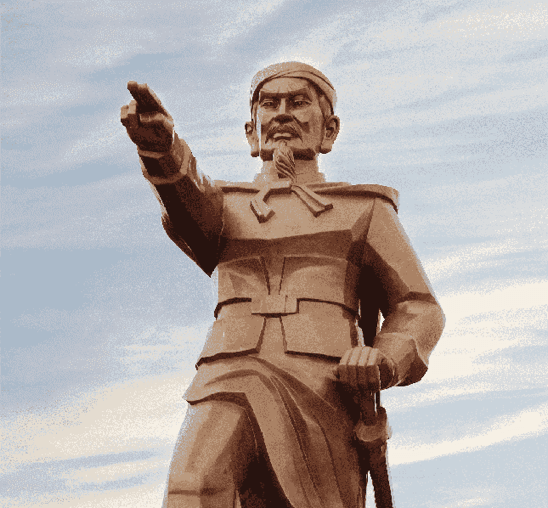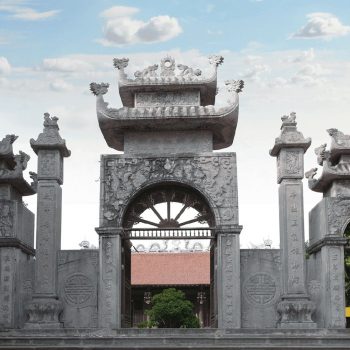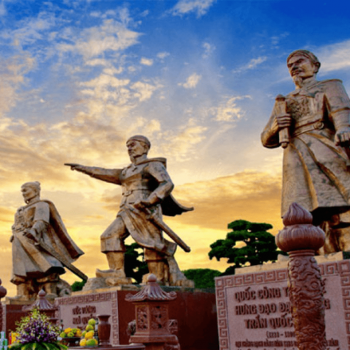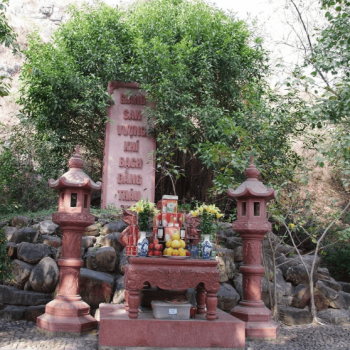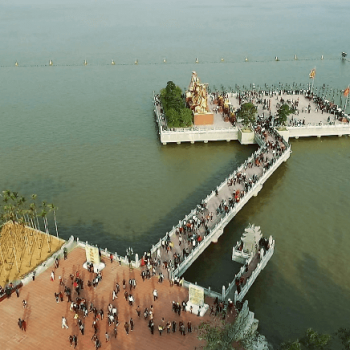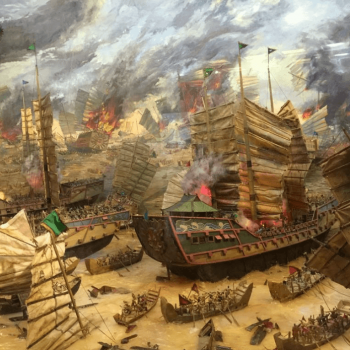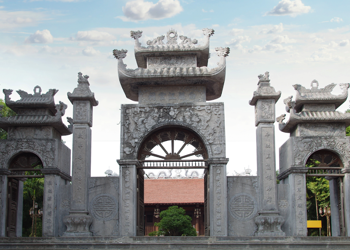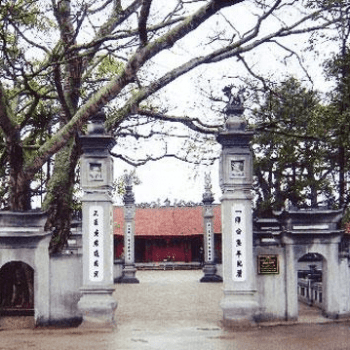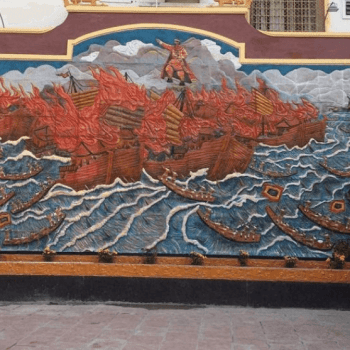King Ngo Quyen seemed to be a handsome man, his eyes shining like lightning, walking like a tiger, outstanding bravery and strength, and peaky power - as the old history described. Of the lineage of the Hao Truong at Duong Lam (Son Tay - Hanoi), he was born in 898. At the time, Tang Dynasty in the North dominated Viet country. The leaders of the localities all took advantage of the opportunity, tried to rebel, liberated the country. Hearing in Duong Xa (Ai Chau - Thanh Hoa), Duong Dinh Nghe has the great will and strong power forces, he came to join to Duong Dinh Nghe's force. And he was favored by Duong Dinh Nghe, he became a general and married Duong Dinh Nghe daughter.
From 905 to 937, he witnessed firsthand the great fluctuations of the country's history.
Khuc Thua Du in Hong Chau (Hai Duong) brought the native forces went to occupy Dai La citadel (Hanoi) of the Duong dynasty, but then the their descendants were subdued and dominated again by the Nam Han dynasty instead of Duong dynasty. Duong Dinh Nghe personally led the Ai Chau army to fight "Dai La strategic battle," created a glorious victory and defeated the Nam Han invaders, but then he was killed by Kieu Cong Tien, a patriarch of Phong Chau (Bach Hac - Viet Tri) ...
Coming here, at the age of 39, he stood out to accept the historical task: punishing the Kieu Cong Tien and fighting against the Nam Han army - Kieu Cong Tien asked for help - invaded the Viet country the second time.
In September 938, with a lightning strike at Dai La, he defeated the inner rebellion, destroying the internal resistance expected by the Nam Han army. Therefore, spending the whole power, preparing resistance against foreign invaders.
At the age of 40, striving to rise above the great mission, he was: Based on the atmosphere of the country that had just come out of the great tribulation of Northern rule, chose the right area of the Bach Dang estuary as a battlefield to fight against the Nam Han army, just when they prepared to enter our country. Using the intelligence and anti-enemy tradition of the nation, creating an ambush method to attack Nam Han on the estuary area, with the powerful support of the pointed iron stake battlefield under water, rhythmic combination with up and down flow of the tide.
Especially mobilizing and commanding forces from many regions of the country, with the enthusiastic support and participation of the people, militia and civilians in the local area near the sea.
On the last day of winter, December 938, under the marshal flag of him, the battle at the Bach Dang estuary broke out, darkening the sky and earth, shaking the river.
The most rapid happening in the history of national resistance wars: In less than a day.
Has a very high battlefield performance: Destroyed the Nam Han battleship fleet, killed the general Luu Hoang Cao at the battle. The Ngo Quyen's strategic battle completely solved the task of a whole career of resistance in just one battle. At the same time, ending the campaign process for over 30 years from Khuc Thua Du to Duong Dinh Nghe - National Liberation to "Vietnamese people own the country". And, officially ending the whole era that is more than a thousand years "Northern domination - Anti-Northern domination".
A glorious "Bach Dang Tradition", a golden "Independence Age of Autonomy", also opened by Bach Dang battle of Ngo Quyen. Because, leading the army that won the Bach Dang battle to return, right in and from the spring of 939, Ngo Quyen decided: To proclaim himself King, to be King of Viet country, to dismiss the position of Porcelain that before Khuc Thua Du and Duong Dinh Nghe had to temporarily accept from the Northern. He selected Co Loa as capital, to express "Re-establishing the nation": The tradition of national independence and self-control, which was been ceased since An Duong Vuong, since more than a thousand years ago when we was lost the Co Loa citadel, and now right at the Co Loa, he restored that tradition.
And the creation, institutions of and for the independent nation. King Ngo Quyen, so he is the right one with: The evaluation of the Le Van Huu historian in the 13th century: “Tien Ngo Vuong could take the newly assembled troops of our Vietnam to defeat hundreds of thousands of troops of Luu Hoang, opening the country and claiming himself King, making the people from the Northern dare not come over again. It can be said that once it was angry but the people will be peace, good stratagems that fight well. ”
Commented by the Ngo Si Lien historian in the 15th century: “Tien Ngo Vuong emerged, not only had the victory, but the placement of hundreds of mandarins, the establishment of royal court ceremonies could see the scale of the Emperor. ”. And praised by the Phan Boi Chau in the early 20th century, calling King Ngo Quyen the "Grand Patriarch of the middle period" in the country building history, behind "The first patriarch who built the country" was Hung Vuong, and stood in front of "The second hero" was Le Loi.
Ha Noi, October 20th, 2019
Written by Le Van Lan historian



